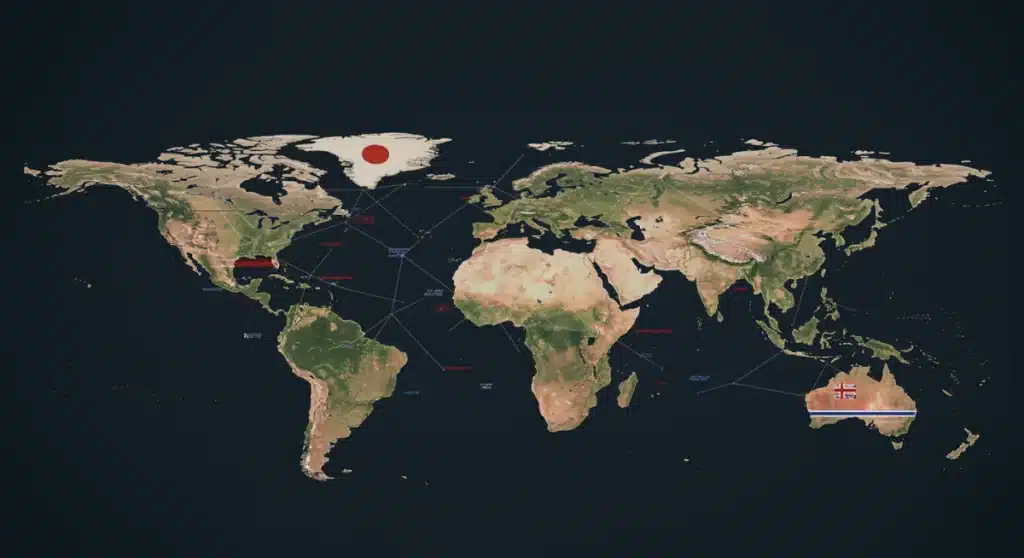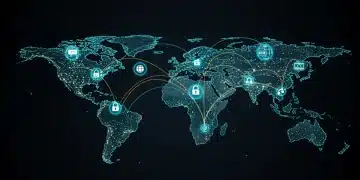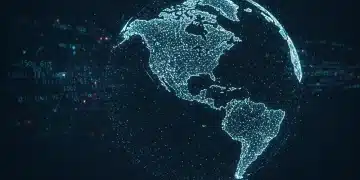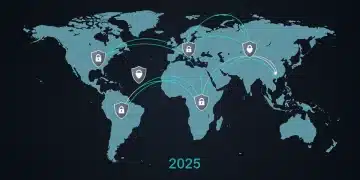The Geopolitics of Internet Governance: 2025 Predictions & US Influence

The Geopolitics of Internet Governance: Expert Predictions for 2025 and US Influence (INSIDER KNOWLEDGE) indicates escalating competition among nation-states for control over digital infrastructure and data flows, profoundly impacting global stability.
The digital realm, once envisioned as a borderless frontier, is now a battleground for national interests. The subject of The Geopolitics of Internet Governance: Expert Predictions for 2025 and US Influence (INSIDER KNOWLEDGE) reveals a complex and rapidly evolving landscape where digital sovereignty, cybersecurity, and data control are central to international relations. What does this mean for the internet’s future?
The Shifting Landscape of Digital Sovereignty
Digital sovereignty is emerging as a cornerstone of national policy, a concept where nations assert control over data, infrastructure, and digital services within their borders. This shift is fundamentally reshaping how the internet operates globally, moving away from a truly open and interconnected system towards more fragmented, nationally controlled networks.
Recent developments indicate a growing trend among various states to implement stricter data localization laws and national cybersecurity frameworks. These measures, while often justified on grounds of national security or data privacy, effectively create digital borders, complicating international data flows and challenging the global nature of the internet. This push for control is a direct response to perceived vulnerabilities and a desire to protect national interests in an increasingly digital world.
National Control and Data Localization
- Data Residency Requirements: Many countries are mandating that data generated by their citizens or within their borders must be stored locally, impacting cloud computing services and global tech companies.
- Content Regulation: Governments are increasingly asserting control over online content, leading to censorship, content filtering, and the blocking of foreign services deemed undesirable.
- Critical Infrastructure Protection: Nations are focusing on securing their digital infrastructure, including undersea cables and data centers, from foreign influence and cyberattacks.
US Influence: A Persistent but Evolving Role
The United States has historically played a dominant role in shaping internet governance, largely due to its early technological leadership and the location of many key internet organizations. However, this influence is now being challenged by rising powers and a global push for multilateral governance models. While the US retains significant sway, its approach is adapting to new geopolitical realities.
Washington’s strategy increasingly involves fostering alliances with like-minded democracies to promote open internet principles, while simultaneously addressing national security concerns through targeted sanctions and export controls on advanced technologies. This dual approach seeks to balance global leadership with strategic competition, particularly against authoritarian regimes. The efficacy of this evolving strategy in maintaining US influence amidst growing digital nationalism remains a key question for 2025.
Cybersecurity as a Geopolitical Weapon
Cybersecurity is no longer just a technical issue; it is a critical component of national security and international relations. State-sponsored cyberattacks, espionage, and disinformation campaigns are becoming more sophisticated and frequent, turning cyberspace into a new domain for geopolitical conflict. The weaponization of digital tools poses significant threats to critical infrastructure, democratic processes, and economic stability worldwide.
Governments are investing heavily in offensive and defensive cyber capabilities, leading to an arms race in the digital sphere. This escalation raises concerns about the potential for miscalculation and unintended conflict, as attribution of cyberattacks remains challenging. International efforts to establish norms of behavior in cyberspace are struggling to keep pace with the rapid advancements in cyber warfare, leaving the global community vulnerable to escalating tensions.
Key Cybersecurity Challenges
- State-Sponsored Attacks: Persistent threats from nation-states targeting critical infrastructure, intellectual property, and government systems.
- Supply Chain Vulnerabilities: Exploitation of weaknesses in global software and hardware supply chains to gain unauthorized access.
- Disinformation Campaigns: Use of social media and other platforms to spread propaganda, influence public opinion, and destabilize adversaries.
The Rise of Multilateral and Multi-Stakeholder Models
While digital sovereignty gains traction, there is also a parallel, albeit slower, movement towards re-evaluating internet governance models. Many nations and civil society groups advocate for more inclusive, multilateral, and multi-stakeholder approaches, moving away from US-centric or state-centric control. This push aims to ensure that the internet remains a global public resource, governed by a diverse set of actors rather than a few dominant powers.
Organizations like the United Nations and the Internet Governance Forum (IGF) are central to these discussions, providing platforms for dialogue among governments, civil society, the private sector, and technical communities. However, reaching consensus on critical issues, such as data privacy, content moderation, and internet access, remains challenging due to divergent national interests and values. The balance between national control and global cooperation will define the future of internet governance.

Technological Decoupling and its Implications
The concept of technological decoupling, particularly between the US and China, is profoundly influencing the global internet ecosystem. This involves efforts by major powers to reduce reliance on rival nations for critical technologies, leading to separate supply chains, competing technical standards, and distinct digital ecosystems. This trend has far-reaching implications for global innovation, economic interconnectedness, and the universality of the internet.
As countries prioritize national security and economic competitiveness, the fragmentation of global technology markets becomes more pronounced. This could result in a ‘splinternet,’ where different regions operate on incompatible technological stacks, hindering cross-border data flows and limiting global collaboration. Businesses face increasing pressure to choose sides, navigate complex regulatory environments, and manage risks associated with geopolitical tensions.
Expert Predictions for 2025: Key Trends
Looking ahead to 2025, experts anticipate several key trends will dominate internet governance geopolitics. Enhanced state control over digital infrastructure and data will continue, driven by national security and economic development priorities. The US will likely intensify its efforts to build coalitions around democratic internet principles, while China and Russia will push for state-centric models, leading to increased ideological competition in the digital sphere.
Furthermore, the battle for control over emerging technologies, such as AI, quantum computing, and 5G networks, will intensify. These technologies are seen as critical for future economic power and military advantage, making their governance a central point of contention. We can expect more sophisticated cyber warfare, targeted regulations on global tech giants, and continued debates over the role of international bodies in shaping the internet’s future.
Anticipated Developments by 2025
- Increased Regulatory Scrutiny: Global tech companies will face a patchwork of national regulations concerning data privacy, content moderation, and anti-trust.
- Dominance of Regional Digital Blocs: The formation of regional digital economies with distinct regulatory frameworks and technical standards.
- Persistent Cyber Espionage: Nation-states will continue to engage in sophisticated cyber operations for intelligence gathering and strategic advantage.
- AI Governance Challenges: Urgent need for international cooperation on ethical guidelines and regulatory frameworks for artificial intelligence.
| Key Aspect | Brief Description |
|---|---|
| Digital Sovereignty | Nations assert control over their digital spaces, data, and infrastructure, leading to fragmented internet policies. |
| US Influence | Evolving US role, balancing global leadership with strategic competition, fostering alliances for open internet principles. |
| Cybersecurity Threats | Increased state-sponsored cyberattacks, espionage, and disinformation campaigns as geopolitical tools. |
| Technological Decoupling | Major powers reducing reliance on rivals for critical tech, leading to separate supply chains and digital ecosystems. |
Frequently Asked Questions About Internet Governance Geopolitics
Digital sovereignty refers to a nation’s ability to control its digital space, including data, infrastructure, and online services, within its borders. It often involves data localization laws and national cybersecurity policies, aiming to protect national interests and citizen privacy from foreign influence.
The US, historically dominant, is now adapting its approach by forming alliances with democracies to promote open internet principles. It also uses sanctions and export controls to counter state-centric models, navigating challenges from rising digital powers and increasing calls for multilateral governance.
Cybersecurity is a vital geopolitical tool, with state-sponsored attacks and espionage becoming frequent. Nations leverage cyber capabilities for strategic advantage, threatening critical infrastructure and economic stability. This creates a digital arms race and complicates international relations due to challenges in attribution.
Technological decoupling involves major powers reducing reliance on rivals for critical technologies, fostering separate supply chains and standards. This trend can lead to a ‘splinternet,’ where regions use incompatible tech, hindering global data flows and innovation, and forcing businesses to navigate complex choices.
By 2025, experts predict increased state control over digital infrastructure and data, intensified competition over emerging technologies like AI, and a likely rise in sophisticated cyber warfare. Regulatory scrutiny on tech giants will grow, alongside continued debates on multilateral governance models and regional digital blocs.
Looking Ahead
The trajectory of internet governance geopolitics points towards a future defined by heightened competition and strategic maneuvering. As nations increasingly view the digital realm as an extension of their geopolitical interests, the principles of an open, global internet face unprecedented challenges. The decisions made in the coming year, particularly concerning data flows, cybersecurity norms, and technological standards, will profoundly shape the digital experience for billions worldwide. Stakeholders must monitor these developments closely, as they will determine the balance between national sovereignty and global connectivity in an ever-more digitalized world.





